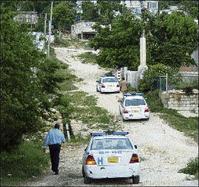Prison without walls: Security analyst suggests radical crime-fighting measures
Published: Sunday | January 11, 2009

Harold Crooks - Rudolph Brown/Chief Photographer
AS JAMAICA grapples with the crime burden, security analyst Harold Crooks is offering his advice to the Government, which he believes can help to reduce the crime rate.
The governing Jamaica Labour Party has promised to reduce the island's runaway murder rate, which already stands at 35, less than two weeks into the New Year.
Government is also looking to pass six crime bills this year to tackle the crime rate, which claimed more than 1,600 lives in 2008 and injured many more.
In an interview at The Gleaner's Kingston offices last week, Crooks, who has just completed a strategic review for the Belizean government for its security forces, is recommending several strategies. One of these he calls "creative lawmaking", which would move the burden of proof from the State to those who are under investigation for crimes related to firearm offences and other serious offences.
"This measure might be breaching traditional legal doctrine; however, it has been breached by other countries facing a national-security crisis. We cannot rely upon classical legal doctrines when the country is in a national-security crisis," he tells The Sunday Gleaner.
threats to nat'l security
In this case, he explains, the Government could do certain things that would not breach the constitutional rights of an individual. The security forces could bring evidence to the security minister, which would prove that the individual is a threat to national security. When these individuals are declared as such, they would not be able to access government contracts, hold a passport or a driver's licence.
"There is nothing in the Constitution that says the minister cannot declare someone a national kingpin. The person has a right to refute the evidence and to contradict the police in a court, or an administrative tribunal. That person should be anxious to prove his legal innocence."
This, according to Crooks, would create a prison without any walls for the individual, because he or she would not be able to access services, which are a privilege at the discretion of the State.
With organised crime, especially extortion, taking root in many urban centres in Jamaica, Crooks believes that tackling the financial base of these organisations is imperative if Jamaica is to win the battle.
"(Prosecuting) extortion in Jamaica requires a complainant. Extortion is one of the means used to create a financial base, and if you want to get to the criminals you need to attack their criminal base and you cannot do it with the Larceny Act, which requires a complainant."
Crooks says the act should be amended to give the police investigative powers, so that they do not have to rely on a complainant.
Another recommendation he believes should be implemented is the use of the 'misprision of felony', which would make it a criminal offence to not report a criminal act. Crooks says that while it is on the books, it is not being used by the police.
"Other countries have enacted legislation to energise the common law, as the citizenry has an obligation to report serious crime and they cannot turn a blind eye."
lying to the police
Crooks also believes that Jamaica should enact laws where it is illegal for any individual to lie to a police officer after he has identified himself. Currently, there is no law in Jamaica which speaks specifically to this.
Repeating calls made by several persons, Crooks believes that the infrastructure to try crimes needs to be improved and thus, calls for swifter trials and longer sentences. He believes that the capabilities of the justice system would be improved if the technology in the courtrooms is improved.
The analyst also believes that the garrisons need to come under tighter control and surveillance by the State.
A garrison is a geographical location controlled by gangs loyal to a political party. Garrisons are controlled by gangsters who instil fear and force the residents to achieve their objectives. It is believed that there are more than seven garrisons scattered across Jamaica.
To control the garrisons, Crooks is calling for closed-circuit television in these communities and the reduction of entrance and exit pathways into such communities. He says changes to the road network - more ways and cul-de-sacs - would give the police greater control.
lack of police training
Turning his attention to the Jamaica Constabulary Force (JCF), Crooks, who has helped to author reports for the Government during his period as an adviser (between 1990-1993), believes that "there is a profound lack of police agents who are trained to infiltrate the criminal underworld.
"The intelligence system in Jamaica relies on traditional informants who sell the police weak information for a high price. 311 (Kingfish) and 811 (Crimestop) are just dependent on concerned citizens playing a role; however, that is child's play.
"We need deeply inserted agents in the criminal underworld to infiltrate the gangs, that is why we have few of the big fish."
The modernisation of the JCF should also be high on the agenda of the Government, Crooks says.
"Simple tracking devices and forensic capabilities are lacking in the JCF, and in a hostile witness environment these would aid the police in bringing criminals to justice," he adds.

Police tour sections of Norwood, one of the informal communities in St James where crime is rampant. - File
















